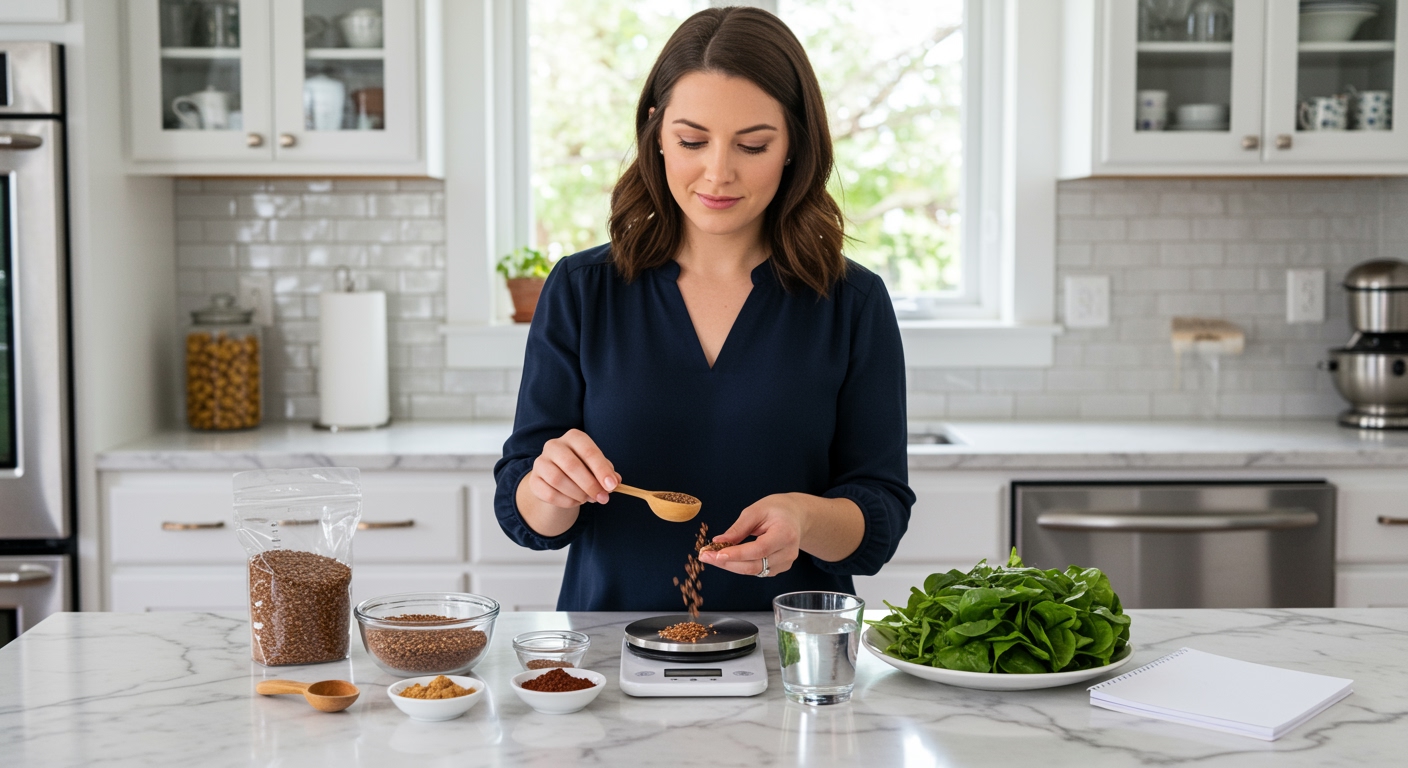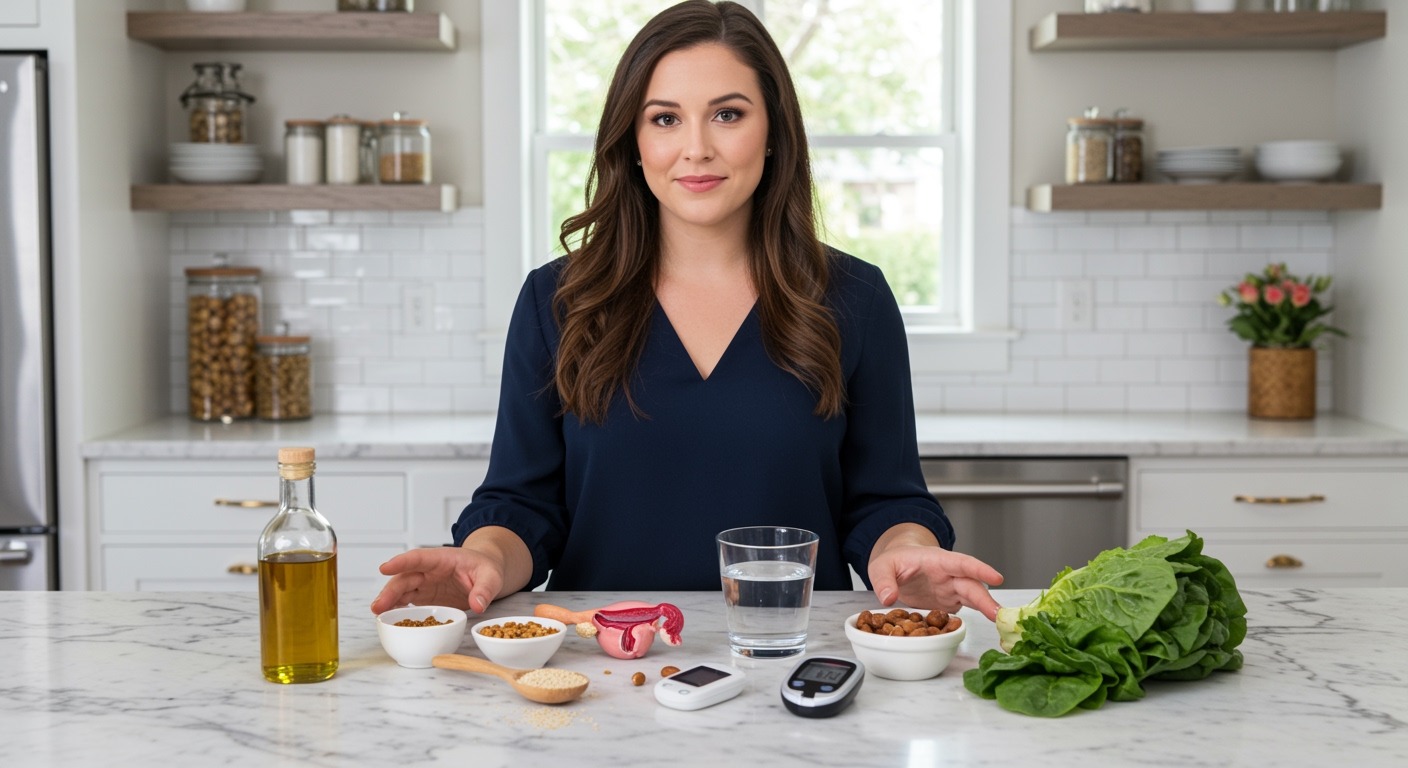✪ Key Takeaway: Flaxseeds can help manage PCOS symptoms by balancing hormones and reducing inflammation when consumed properly.
Introduction
You scroll through social media and see countless posts claiming flaxseeds are the miracle cure for PCOS.
You might be wondering if these tiny brown seeds can really help balance your hormones and reduce those frustrating PCOS symptoms that affect your daily life.
Hi, I am Abdur, your nutrition coach and today I am going to explain exactly how flaxseeds work for PCOS and whether they deserve a place in your daily routine.
What Makes Flaxseeds Special For PCOS?
Flaxseeds contain three powerful compounds that directly target PCOS symptoms at their root cause.
The first compound is lignans, which are plant-based estrogens that help balance your hormone levels naturally.
These lignans work by binding to estrogen receptors in your body and modulating hormone activity when levels are too high or too low.
The second key component is omega-3 fatty acids, specifically alpha-linolenic acid, which reduces chronic inflammation common in PCOS.
Chronic inflammation drives insulin resistance, making it harder for your body to regulate blood sugar and contributing to weight gain around your midsection.
The third component is soluble fiber, which slows down sugar absorption and helps maintain steady blood glucose levels throughout the day.
This fiber also feeds beneficial gut bacteria that produce short-chain fatty acids, further supporting metabolic health and hormone balance.
✪ Fact: Just two tablespoons of ground flaxseeds provide 75-800 times more lignans than other plant foods.
How Do Flaxseeds Actually Balance Your Hormones?
Your body converts flaxseed lignans into enterolactone and enterodiol through bacterial fermentation in your large intestine.
These metabolites have a unique ability to act as both weak estrogens and anti-estrogens depending on your current hormone levels.
When your estrogen levels are too high, these compounds compete with stronger estrogens for receptor sites, effectively lowering overall estrogenic activity.
When estrogen levels are too low, they provide gentle estrogenic support to help maintain hormonal balance.
Research shows that women with PCOS who consumed 30 grams of flaxseeds daily experienced significant reductions in testosterone levels within 12 weeks.
The same study found improvements in hirsutism scores, meaning less unwanted hair growth on the face and body.
Flaxseeds also help increase sex hormone-binding globulin, a protein that binds to excess androgens and reduces their biological activity in your tissues.
✪ Pro Tip: Ground flaxseeds are more effective than whole seeds because your body can better absorb the beneficial compounds.
Can Flaxseeds Help With PCOS Weight Management?
The fiber content in flaxseeds creates a gel-like substance in your stomach that slows digestion and increases feelings of fullness.
This natural appetite suppression helps you eat fewer calories throughout the day without feeling deprived or constantly hungry.
Studies show that women who added flaxseeds to their diet lost more belly fat compared to those following the same diet without flaxseeds.
The omega-3 fatty acids in flaxseeds also improve insulin sensitivity, making it easier for your cells to use glucose for energy instead of storing it as fat.
Better insulin sensitivity means your pancreas does not have to work as hard to maintain normal blood sugar levels.
This reduces the constant insulin spikes that drive fat storage, particularly around your waist where PCOS-related weight gain typically occurs.
✪ Note: Start with one tablespoon daily and gradually increase to avoid digestive discomfort from the high fiber content.
What Is The Right Way To Use Flaxseeds For PCOS?
The most effective approach is consuming two tablespoons of freshly ground flaxseeds daily, preferably divided between morning and evening.
You should grind whole flaxseeds in a coffee grinder or high-speed blender just before eating to preserve the omega-3 oils from oxidation.
Pre-ground flaxseed meal from the store often sits on shelves for months, losing much of its nutritional potency and developing a rancid taste.
Mix your freshly ground flaxseeds into smoothies, yogurt, oatmeal, or sprinkle them over salads for easy daily consumption.
Always drink plenty of water when eating flaxseeds because the high fiber content needs adequate hydration to work properly in your digestive system.
Some women practice seed cycling, eating flaxseeds during the first half of their menstrual cycle to support estrogen production naturally.
However, for PCOS management, consistent daily consumption appears more beneficial than cyclical use based on current research evidence.
✪ Pro Tip: Store whole flaxseeds in the refrigerator and ground flaxseeds in the freezer to maintain freshness and potency.
Are There Any Risks Or Side Effects To Consider?
Most women tolerate flaxseeds well, but some may experience digestive upset when first introducing them into their diet.
Common side effects include bloating, gas, and changes in bowel movements as your gut bacteria adjust to the increased fiber intake.
These symptoms typically resolve within a few weeks as your digestive system adapts to processing the additional fiber.
Women taking blood-thinning medications should consult their healthcare provider before adding large amounts of flaxseeds to their diet.
The omega-3 fatty acids in flaxseeds can have mild anticoagulant effects that might interact with certain medications.
If you have a history of hormone-sensitive cancers, discuss flaxseed consumption with your oncologist due to their phytoestrogenic properties.
While research suggests flaxseeds may actually be protective against hormone-related cancers, individual medical history should guide your decision.
✪ Note: Raw flaxseeds contain small amounts of cyanogenic glycosides, but normal consumption levels pose no health risks.
The Bottom Line
Flaxseeds are indeed beneficial for PCOS management when used consistently and properly as part of a comprehensive approach to hormone balance.
Small seeds can create big changes, but only when you commit to the daily habit of nourishing your body with intention.
I would love to hear about your experience with flaxseeds for PCOS or any questions you might have about incorporating them into your daily routine in the comments below.
References
At NutritionCrown, we use quality and credible sources to ensure our content is accurate and trustworthy. Below are the sources referenced in writing this article:





